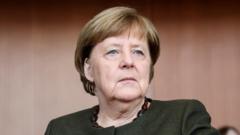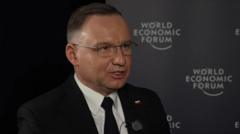The leader of Germany's CDU party, Friedrich Merz, may rely on support from the far-right Alternative für Deutschland (AfD) to pass new immigration legislation, despite previous commitments to avoid collaboration. His actions have drawn criticism from multiple parties and former Chancellor Angela Merkel, as public protests against this cooperation emerge.
CDU Leader Considers Far-Right Support for Immigration Legislation Amid Controversy

CDU Leader Considers Far-Right Support for Immigration Legislation Amid Controversy
Friedrich Merz's potential reliance on the far-right AfD for immigration law votes sparks widespread backlash and protests in Germany.
In a significant political shift, Friedrich Merz, the leader of Germany's conservative Christian Democratic Union (CDU), may once again look to the far-right Alternative für Deutschland (AfD) for support on immigration legislation—a move that has incited considerable backlash. This potential collaboration comes just days after a contentious vote that saw a non-binding motion on immigration law pass through Germany's parliament.
Merz, seen by many as the frontrunner to become Germany's next leader, has been criticized for straying from earlier promises to refrain from working with the AfD. Former Chancellor Angela Merkel, in a rare political intervention, condemned Merz for what she describes as a betrayal of a commitment he made to govern alongside the Social Democrats (SPD) and the Greens rather than the far-right party.
In response to the mounting criticism, Merz defended his position by stating, "A right decision doesn't become wrong just because the wrong people agree to it." His comments reflect a desire to solidify a tougher immigration policy, a central issue as Germany approaches snap elections next month. The CDU currently leads in election polls, but the AfD is not far behind.
Protests erupted in various cities as thousands gathered to denounce the CDU's potential collaboration with the AfD, which has been linked to right-wing extremist elements. The proposed immigration measures, which aim to tighten immigration controls and limit rights for family reunification, are opposed by current Chancellor Olaf Scholz and his SPD, who have branded Merz's reliance on the AfD an "unforgivable mistake" that undermines the democratic fabric of Germany.
The political climate surrounding immigration has intensified, especially following recent violent incidents involving asylum seekers, bringing the issue to the forefront of electoral discussions. The CDU's controversial strategy raises questions about the interplay between policy, public sentiment, and the far-right's growing influence in German politics as the nation prepares for a crucial election period.




















